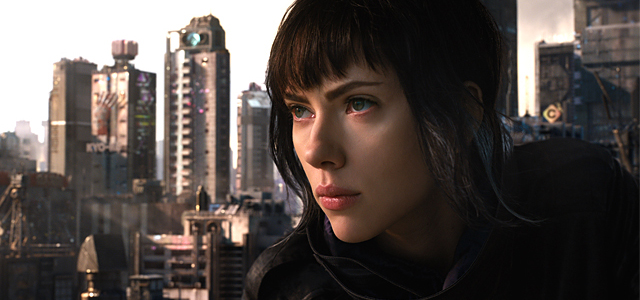Review: Ghost in the Shell
(M) Scarlett Johansson, Pilou Asbæk, Michael Pitt
What humans do is what defines them. That deep statement about the nature of humanity comes from new sci-fi blockbuster Ghost in the Shell. The same sci-fi blockbuster being advertised with star Scarlett Johansson wearing a clinging bodysuit that leaves little to the imagination.
Sadly, imagination is a lacking ingredient in this Hollywood reboot of a fan-favourite Japanese exploration of the intersection between people and robots. While Ghost in the Shell is a visual treat and offers more than Johansson wearing not very much, style still triumphs over substance. This simplified version of a cult classic only hints at the philosophical gold it digs up, including that provocative statement about what defines humanity.
Ghost in the Shell was a bestselling manga series (Japanese comic books) before it became, in 1995, an anime hit (Japanese animation). The original didn’t set new records for investigating the essence of humanity but it was more ambiguous, creative and weird with its existential angst than Hollywood’s reboot. The opening minutes SPELL OUT what a “ghost” and “shell” are, and this paint-by-numbers beginning indicates how going beyond the surface of what confronts Major (Johansson) will remain a steady issue.
In a near-future city resembling Blade Runner, Back to the Future 2 and The Fifth Element, Major is on the hunt for super-hacker Kuze (Michael Pitt). Helped by a posse of cyber-enhanced soldiers, including Batou (Pilou Asbæk, best know for Danish TV series Borgen), Major is the first successful example of a human brain/soul (“ghost”) implanted within a cyborg’s body (“shell”).
Built to be a government weapon, Major has her moments of pondering whether she still can be considered human. That massive question has plagued humans since, well, humans began. You can easily draw a line from ancient Greek philosophers (Plato’s dualism) to recent movies (Ex Machina) or TV shows (Westworld), as they share an ongoing inquiry into what it means to be a human.
Where the long-held Christian understanding of humanity rests in the far-out knowledge that God created humans in his image (Genesis 1:27), Ghost in the Shell only includes human creators. Major’s modest meditations on existence are located within a Westernised version of Eastern beliefs about the body, soul and afterlife. In stark contrast with the possibility of eternal life held out by Jesus Christ (John 3:16, 1 John 5:13-14), the near-future of Ghost in the Shell only sees as far as the hear and now. With no suggestion of the life after death outlined in 1 Corinthians 15, Major’s sights are impassively stuck on whether a human can be said to even exist, without their flesh-and-blood body.
Borrowing bits and pieces from the original Ghost in the Shell, its sequels and TV spin-off, Major’s first adventure in Hollywood is an origins story about, well, her origins. And what they might mean for what it means to be a human in a society wanting to be more like machines.
Unlike plenty of big-budget, English-speaking blockbusters, Ghost in the Shell is commendably slowburning and subdued. But despite its impressive ability to not just blow stuff up, it spends little time contemplating the big issues which keep showing up. Instead, the limited storyline wanders through slo-mo shoot outs and cool cinematography as Johansson acts more like a robot than her cartoon counterpart from the 1995 anime. As she does, Ghost in the Shell keeps avoiding any human gut-punches about identity, purpose and what lies beyond death.
The closest it gets to rattling our existential cage is when it defines a human by their actions. But given we’ve spent more than an hour and a half with robots who also do defining actions, Ghost in the Shell hardly puts that case strongly for what it means to be a person. However, the tantalising story’s indications of higher consciousness and soul searching suggest there might be much, much more to life than, well, life.
That’s the sort of mind-blowing stuff that the Bible routinely reveals about what it is to be a human. Without itemising or drawing a diagram, God has heaps to share about what defines a human. Ghost in the Shell only stretches as far as defining humans by what they do, yet God’s not so limited or unimaginative.
Humans are different (1 Corinthians 12) and will do, say and think all kinds of various stuff (Ecclesiastes 3:1-8; Acts 17:26-29. Yet every human is given their own individual body, which is dead without its individual “spirit” (James 2:26). There is something unique and intrinsic about us, humans, which conjoins “ghost” and “shell”.
If you want to do more than just dip a toe in the ocean of what it is to be human, as Ghost in the Shell does, dive into the body and soul odyssey that is the Bible.
Ben McEachen











